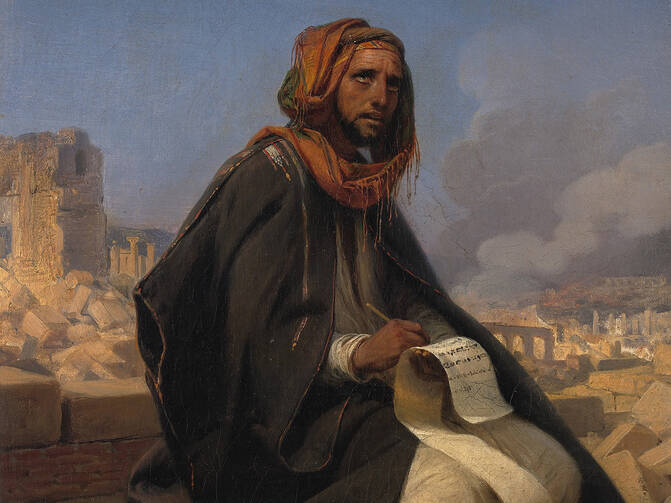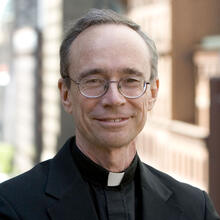(RNS) — In the Catholic weekday liturgy, we are currently hearing from Prophet Jeremiah, who warns us not to listen to false prophets.
Before the Second Vatican Council (1962-1965), Catholics only heard a very limited number of Scripture passages during Mass. On innumerable weekdays in the 1950s, I heard the parable of the 10 wise and 10 foolish virgins because this was the Gospel used on feasts of virgin saints, which pack the Catholic calendar.
One of the great liturgical reforms after the Second Vatican Council was an expansion of the Scripture readings used in weekday and Sunday lectionaries so that Catholics now hear a lot more of the Bible than we did in the past. Sadly, Catholics are still less familiar with the Bible than our Protestant brothers and sisters, but at least the church is now encouraging the laity to read the Scriptures.
The daily Scripture readings are readily available on the USCCB website, in apps such as iBreviary and, if you are lazy like me, ask Alexa to “Play Catholic Daily.” Other apps, like Pray As You Go, provide music and reflections with the readings.
In even-numbered years, like 2024, we hear from Jeremiah at this time of the year. On Monday, part of the 18th week in Ordinary Time, Jeremiah (Jeremiah 28:1-17) is going after Hananiah, a false prophet, who is prophesizing the defeat of the Babylonian Empire and the return of the temple vessels that Nebuchadnezzar took to Babylon as plunder. Hananiah is promising to bring back all the Jewish exiles from Babylon and make Israel great again.
“I will break the yoke of the king of Babylon,” The Lord says, according to Hananiah.
Jeremiah wishes this were true, but he warns the people that following Hananiah will simply make matters worse. They will trade a yoke of wood for a yoke of iron.
“Hear this, Hananiah!” said Jeremiah. “The Lord has not sent you, and you have raised false confidence in this people.”
Jeremiah, of course, proved correct and the people suffered for following Hananiah, a false prophet.
Today, we again see the dangers of false prophets who promise everything will be fine if we follow them. This is very tempting because they promise an easy path that does not require sacrifice. We are told that we can have everything. We reach for short-term pleasures without considering long-term consequences.
We spend as fast as the money comes in, and we borrow if we want more. “Charge it” becomes a way of having it all now and postponing the day of reckoning.
We also do this with our world, using water and natural resources as if the supply were infinite, burning fossil fuels as if had have no impact on the climate, using plastics that pollute our water and our bodies. We are killing off species of fish, animals and plants with no thought of tomorrow.
If global warming is even half as bad as predicted, our generation will go down in history as the most irresponsible and destructive generation of all time. The damage we are doing will take millennia to repair.
We believe snake oil salesmen who tell us we can have huge government programs and cut taxes at the same time. We believe those who blame migrants or others when there is lots of blame to be shared by everyone. The false prophets promise to bring us happiness by destroying our enemies. They say that we can all have guns and only bad guys will be hurt.
We want to believe that we can have it all and not worry about others or the future. Like Eve, we want to believe the snake.
Pope Francis argues in his encyclical “Evangelii Gaudium” that an economy based on greed and self-interest will ultimately destroy itself. Without a concern for the common good, without a concern for future generations, without a concern for our planet, we run off the cliff like a herd of lemmings.
And yet false prophets tell us that global warming will not happen, microplastics do not cause cancer, guns will protect us, and the poor need to suffer to motivate them to work. “Seek your own self-interest; everything else is not your concern,” they tell us.
A true prophet reflects the teachings of Jesus and the other biblical prophets. A true prophet calls us to love, justice and self-sacrifice. A true prophet is concerned about the poor, the widows and orphans. A true prophet defends workers and migrants. A true prophet is critical of the rich and powerful who ignore their responsibilities for the common good.
Jesus calls us to generosity, to forgiveness, to sacrifice. Jesus’ message of love does not compete well against the messages of Madison Avenue and Hollywood where it is all about “me.”
We need to pay attention to the true prophets of our time and reject the false prophets who lead us astray.








